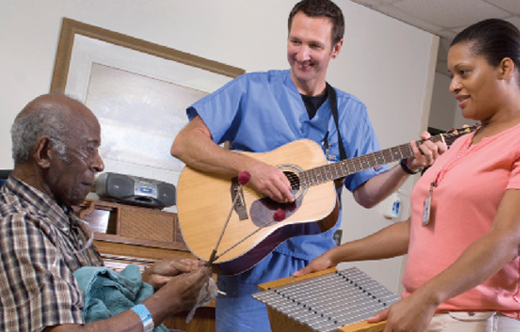"Larry was an artist, a musician, sculptor, and jewelry maker. There wasn't anything he couldn't do." A sheen of tears layered his wife's eyes as she started a video monologue, detailing their charmed life of the past, the seizure which happened out of the blue, and the reality of their life now. The story doesn't end in heartbreak, however.
Music therapist Moreen Borsch began working with Larry, singing, playing the piano, and strumming guitar, using these activities to improve speech and strengthen muscle coordination. As his wife reconciled her memories of the past with the harsh edges of the present, watching her husband come alive through music was an unsurpassed joy. His cheerfulness and upbeat manner were completely attributed to music acting as the spur.
Music therapy can enhance the quality of life for people with conditions ranging from dementia, chronic pain, cancer, addictions, anxiety disorders, and numerous others. The American Music Therapy Association relays music therapy interventions can be designed to:
- Promote Wellness
- Manage Stress
- Alleviate Pain
- Express Feelings
- Enhance Memory
- Improve Communication
- Promote Physical Rehabilitation
Music is a unique and special tool which can be used to benefit all members of a family unit. Heavens, who WOULDN'T want to experience all of the bullet points above?! The truth of the matter is, you don't need to be a professional music therapist to utilize it in a daily routine. Being in the elder care business where compassion rules and sometimes music is just sensible, ACCFamily encourages you to creatively implement music in the fabric of your life. Caregivers especially can benefit from this specific therapy.
AARP blogger Amy Goyer gives a list of practical ways, acting as caregiver or loved one, to incorporate music into the everyday:
- I keep a CD player on the back porch where Dad likes to sit in the sunshine and listen to his favorite tunes — everything from classical to World War II-era music to Josh Groban. It transforms a solitary time into a fun, relaxing or stimulating experience and activity for him.
- I keep a DVD library and I use the DVR to tape musicals (hint: TCM airs them frequently!). We watch them often as the plots are easier to follow, they keep Dad’s attention and Mom enjoys them … and Dad and I sing along! Dad and I frequently have spontaneous dance contests as we view them. Seven Brides for Seven Brothers, The Sound of Music and Oklahoma are just a few of our faves.
- Dad likes to take the dog for several walks every day, and I turn our walks into musical adventures. Physical activity and music are a golden combination for brain stimulation. It’s amazing to me the songs that Dad will remember when we’re walking — the other day he sang one of his college fraternity songs for me that I had never heard before — when we got home he sang it for Mom. He’s so adorable! When we walk, if he begins to drag his feet, I encourage him to play drill sergeant (he’s a WWII veteran) and he calls out the march and then we sing patriotic songs. His pace instantly picks up and the shuffling stops.
So let's get snappin', foots'a tappin', hands'a clappin' - because song will set us free!



